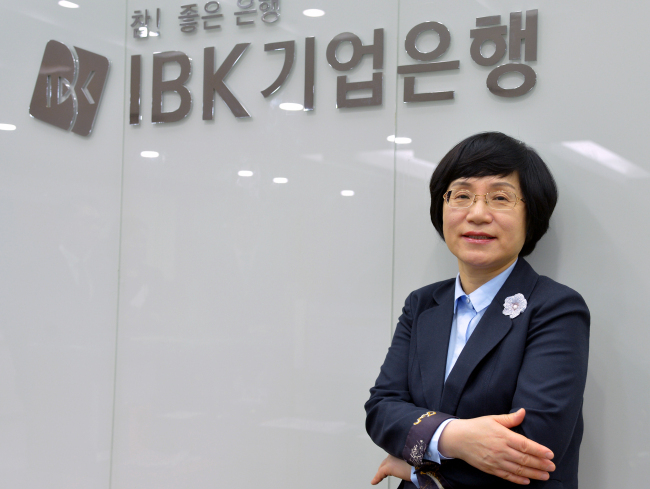The new corporate paradigm of focusing on qualitative over quantitative growth seems to have fueled the latest success of the state-run Industrial Bank of Korea.
“This year, IBK has been all about improving stability,” said Park Sung-ho, head of investor relations at IBK, giving CEO Kwon Seon-joo the credit for leading the transformation.
Since her inauguration in January, Kwon has steadily pushed asset soundness as her top management priority. Her unwavering drive to cultivate higher-quality assets has created a virtuous cycle, Park said, as the assets in turn pumped up interest margins to boost the bank’s net profits.
 |
Kwon Seon-joo, CEO of Industrial Bank of Korea. (Yoon Byung-chan/The Korea Herald) |
Prospects for IBK’s growth were dim at the beginning of the year, as the bank was reassigned as a state-run organization in January, after years of privatization efforts ended in failure.
Further dampening the outlook, many had expected Kwon ― who became the first woman in Korea to head a local bank ― to be a low-key figure who would focus only on internal realignment.
These views turned out to be wrong.
On Tuesday, IBK said operating profit in the second quarter reached 378.9 billion won ($369 million), up 45 percent from the same period last year. Net profit, too, jumped by 39 percent to 292.6 billion won.
Reflecting this earnings surprise, the bank’s stock hit a new high the following day, peaking at 16,900 won during Wednesday trading.
Korea Investment & Securities upgraded IBK’s target stock value from 17,000 won to 20,000 won, speculating that the bank’s net profit would exceed 1 trillion won by the year-end.
While the overall profit increased, the bank also remained faithful to its fundamental role as a lender for small and medium-sized companies.
The bank’s loan balance for SMEs in the second quarter stood at 113 trillion won, up 3.9 percent from the end of last year, according to IBK officials.
“We have all but met our target of extending 4.4 trillion won of loans to small and mid-sized firms this year,” Park said.
Although it failed to meet the unbinding 45 percent quota on SME loans that commercial banks are encouraged to meet, IBK still came out on top as the leading lender to smaller firms. IBK controls 22.6 percent of the SME loan market.
A possible risk factor for the bank in the long term is its heavy reliance on its banking business. Other large banks usually have insurance, capital and other financial businesses to fall back on.
IBK has conceded that it was unable to adopt the financial holding company system mostly due to weaknesses in its nonbanking affiliates.
“We are currently not considering the transition (to a holding company), but we must still reinforce our nonbanking operations in order to survive the competition,” an IBK spokesman said.
By Bae Hyun-jung (
tellme@heraldcorp.com)






![[Exclusive] Hyundai Mobis eyes closer ties with BYD](http://res.heraldm.com/phpwas/restmb_idxmake.php?idx=644&simg=/content/image/2024/11/25/20241125050044_0.jpg)
![[Herald Review] 'Gangnam B-Side' combines social realism with masterful suspense, performance](http://res.heraldm.com/phpwas/restmb_idxmake.php?idx=644&simg=/content/image/2024/11/25/20241125050072_0.jpg)
